Sociology Report: Poverty, Community Service, and Social Issues
VerifiedAdded on 2022/10/08
|6
|1407
|20
Report
AI Summary
This report, titled "Introduction to Sociology," delves into the multifaceted issue of poverty, examining its causes, effects, and potential solutions through a sociological lens. The report highlights poverty as a critical global concern, emphasizing that it extends beyond mere economic limitations to encompass the inability to access essential resources like food, water, healthcare, and education. The author identifies key contributors to poverty, including conflict, social inequality, and unemployment, and provides real-world examples such as the ongoing violence in Syria and the situation in the Democratic Republic of Congo (DRC). The report addresses common stereotypes about poverty, such as the misconception that poor people are lazy or unconcerned with education, and offers counterarguments based on observations and research. The author's community service experience in Bukavu, DRC, provides firsthand insights into the harsh realities of poverty, including inadequate food, poor sanitation, and lack of access to healthcare. The report concludes by discussing the roles of international organizations in addressing poverty and promoting social and economic development. The author also highlights the impact of political corruption in the DRC and the efforts of the international community to mediate conflicts and provide aid.
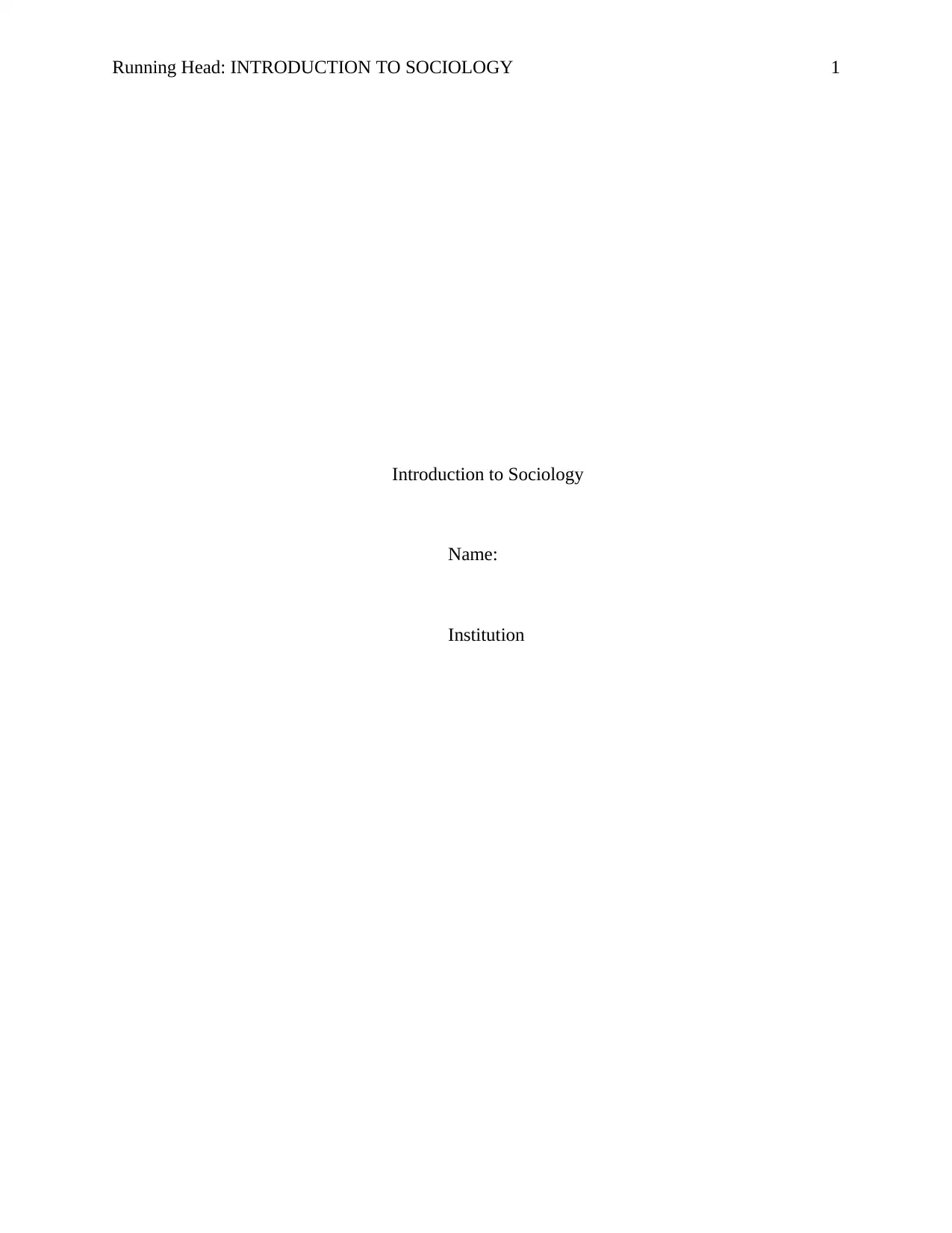
Running Head: INTRODUCTION TO SOCIOLOGY 1
Introduction to Sociology
Name:
Institution
Introduction to Sociology
Name:
Institution
Paraphrase This Document
Need a fresh take? Get an instant paraphrase of this document with our AI Paraphraser
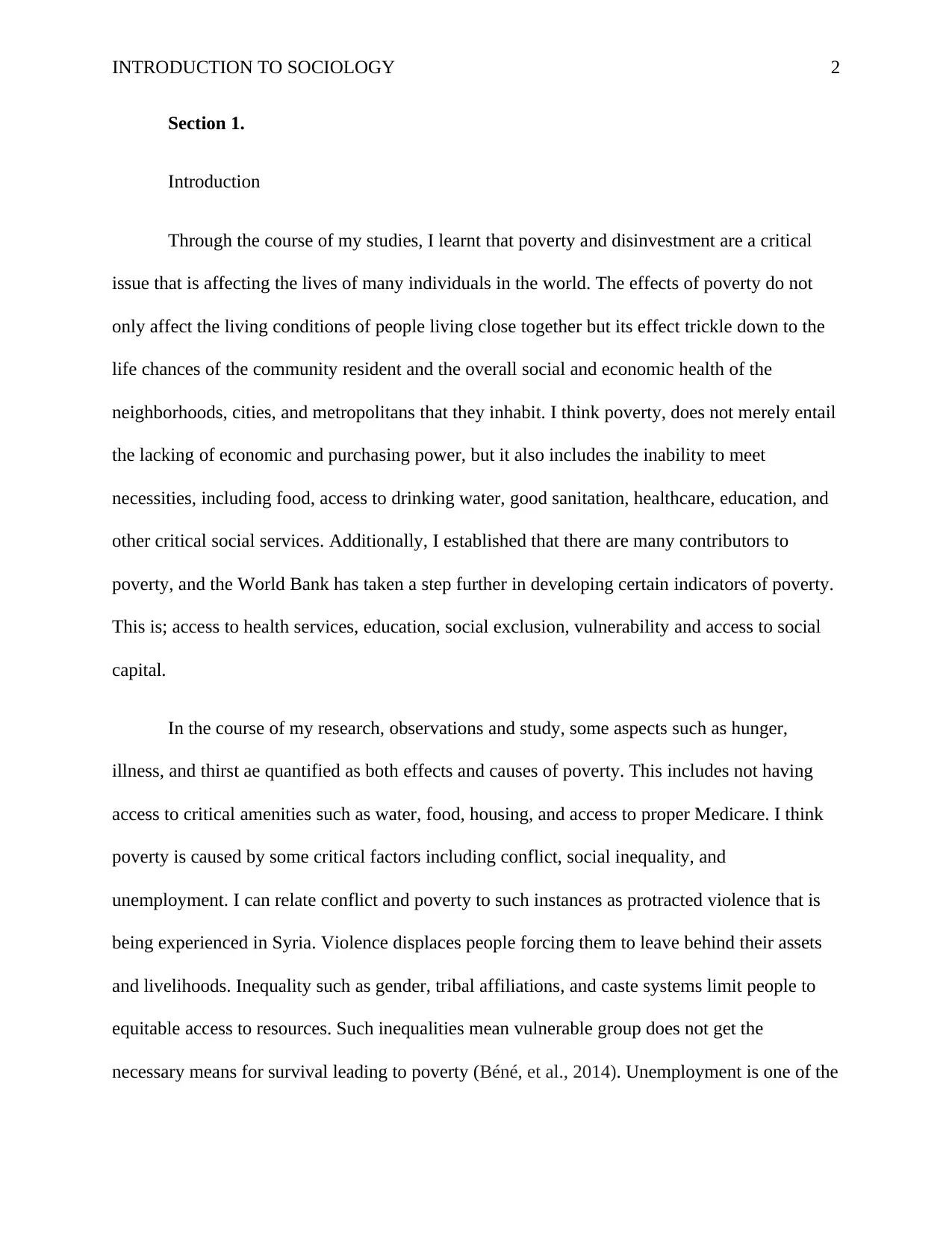
INTRODUCTION TO SOCIOLOGY 2
Section 1.
Introduction
Through the course of my studies, I learnt that poverty and disinvestment are a critical
issue that is affecting the lives of many individuals in the world. The effects of poverty do not
only affect the living conditions of people living close together but its effect trickle down to the
life chances of the community resident and the overall social and economic health of the
neighborhoods, cities, and metropolitans that they inhabit. I think poverty, does not merely entail
the lacking of economic and purchasing power, but it also includes the inability to meet
necessities, including food, access to drinking water, good sanitation, healthcare, education, and
other critical social services. Additionally, I established that there are many contributors to
poverty, and the World Bank has taken a step further in developing certain indicators of poverty.
This is; access to health services, education, social exclusion, vulnerability and access to social
capital.
In the course of my research, observations and study, some aspects such as hunger,
illness, and thirst ae quantified as both effects and causes of poverty. This includes not having
access to critical amenities such as water, food, housing, and access to proper Medicare. I think
poverty is caused by some critical factors including conflict, social inequality, and
unemployment. I can relate conflict and poverty to such instances as protracted violence that is
being experienced in Syria. Violence displaces people forcing them to leave behind their assets
and livelihoods. Inequality such as gender, tribal affiliations, and caste systems limit people to
equitable access to resources. Such inequalities mean vulnerable group does not get the
necessary means for survival leading to poverty (Béné, et al., 2014). Unemployment is one of the
Section 1.
Introduction
Through the course of my studies, I learnt that poverty and disinvestment are a critical
issue that is affecting the lives of many individuals in the world. The effects of poverty do not
only affect the living conditions of people living close together but its effect trickle down to the
life chances of the community resident and the overall social and economic health of the
neighborhoods, cities, and metropolitans that they inhabit. I think poverty, does not merely entail
the lacking of economic and purchasing power, but it also includes the inability to meet
necessities, including food, access to drinking water, good sanitation, healthcare, education, and
other critical social services. Additionally, I established that there are many contributors to
poverty, and the World Bank has taken a step further in developing certain indicators of poverty.
This is; access to health services, education, social exclusion, vulnerability and access to social
capital.
In the course of my research, observations and study, some aspects such as hunger,
illness, and thirst ae quantified as both effects and causes of poverty. This includes not having
access to critical amenities such as water, food, housing, and access to proper Medicare. I think
poverty is caused by some critical factors including conflict, social inequality, and
unemployment. I can relate conflict and poverty to such instances as protracted violence that is
being experienced in Syria. Violence displaces people forcing them to leave behind their assets
and livelihoods. Inequality such as gender, tribal affiliations, and caste systems limit people to
equitable access to resources. Such inequalities mean vulnerable group does not get the
necessary means for survival leading to poverty (Béné, et al., 2014). Unemployment is one of the
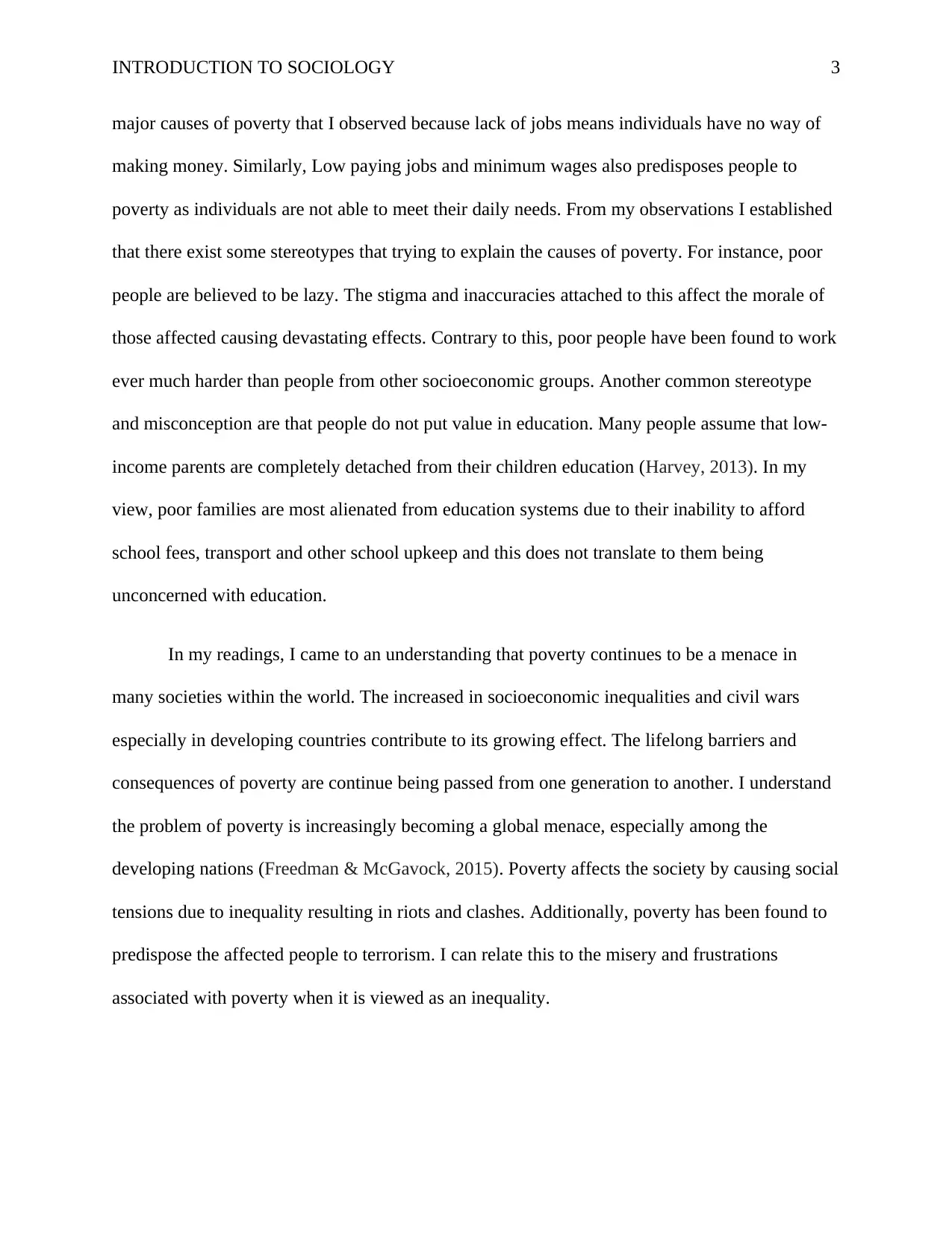
INTRODUCTION TO SOCIOLOGY 3
major causes of poverty that I observed because lack of jobs means individuals have no way of
making money. Similarly, Low paying jobs and minimum wages also predisposes people to
poverty as individuals are not able to meet their daily needs. From my observations I established
that there exist some stereotypes that trying to explain the causes of poverty. For instance, poor
people are believed to be lazy. The stigma and inaccuracies attached to this affect the morale of
those affected causing devastating effects. Contrary to this, poor people have been found to work
ever much harder than people from other socioeconomic groups. Another common stereotype
and misconception are that people do not put value in education. Many people assume that low-
income parents are completely detached from their children education (Harvey, 2013). In my
view, poor families are most alienated from education systems due to their inability to afford
school fees, transport and other school upkeep and this does not translate to them being
unconcerned with education.
In my readings, I came to an understanding that poverty continues to be a menace in
many societies within the world. The increased in socioeconomic inequalities and civil wars
especially in developing countries contribute to its growing effect. The lifelong barriers and
consequences of poverty are continue being passed from one generation to another. I understand
the problem of poverty is increasingly becoming a global menace, especially among the
developing nations (Freedman & McGavock, 2015). Poverty affects the society by causing social
tensions due to inequality resulting in riots and clashes. Additionally, poverty has been found to
predispose the affected people to terrorism. I can relate this to the misery and frustrations
associated with poverty when it is viewed as an inequality.
major causes of poverty that I observed because lack of jobs means individuals have no way of
making money. Similarly, Low paying jobs and minimum wages also predisposes people to
poverty as individuals are not able to meet their daily needs. From my observations I established
that there exist some stereotypes that trying to explain the causes of poverty. For instance, poor
people are believed to be lazy. The stigma and inaccuracies attached to this affect the morale of
those affected causing devastating effects. Contrary to this, poor people have been found to work
ever much harder than people from other socioeconomic groups. Another common stereotype
and misconception are that people do not put value in education. Many people assume that low-
income parents are completely detached from their children education (Harvey, 2013). In my
view, poor families are most alienated from education systems due to their inability to afford
school fees, transport and other school upkeep and this does not translate to them being
unconcerned with education.
In my readings, I came to an understanding that poverty continues to be a menace in
many societies within the world. The increased in socioeconomic inequalities and civil wars
especially in developing countries contribute to its growing effect. The lifelong barriers and
consequences of poverty are continue being passed from one generation to another. I understand
the problem of poverty is increasingly becoming a global menace, especially among the
developing nations (Freedman & McGavock, 2015). Poverty affects the society by causing social
tensions due to inequality resulting in riots and clashes. Additionally, poverty has been found to
predispose the affected people to terrorism. I can relate this to the misery and frustrations
associated with poverty when it is viewed as an inequality.
⊘ This is a preview!⊘
Do you want full access?
Subscribe today to unlock all pages.

Trusted by 1+ million students worldwide
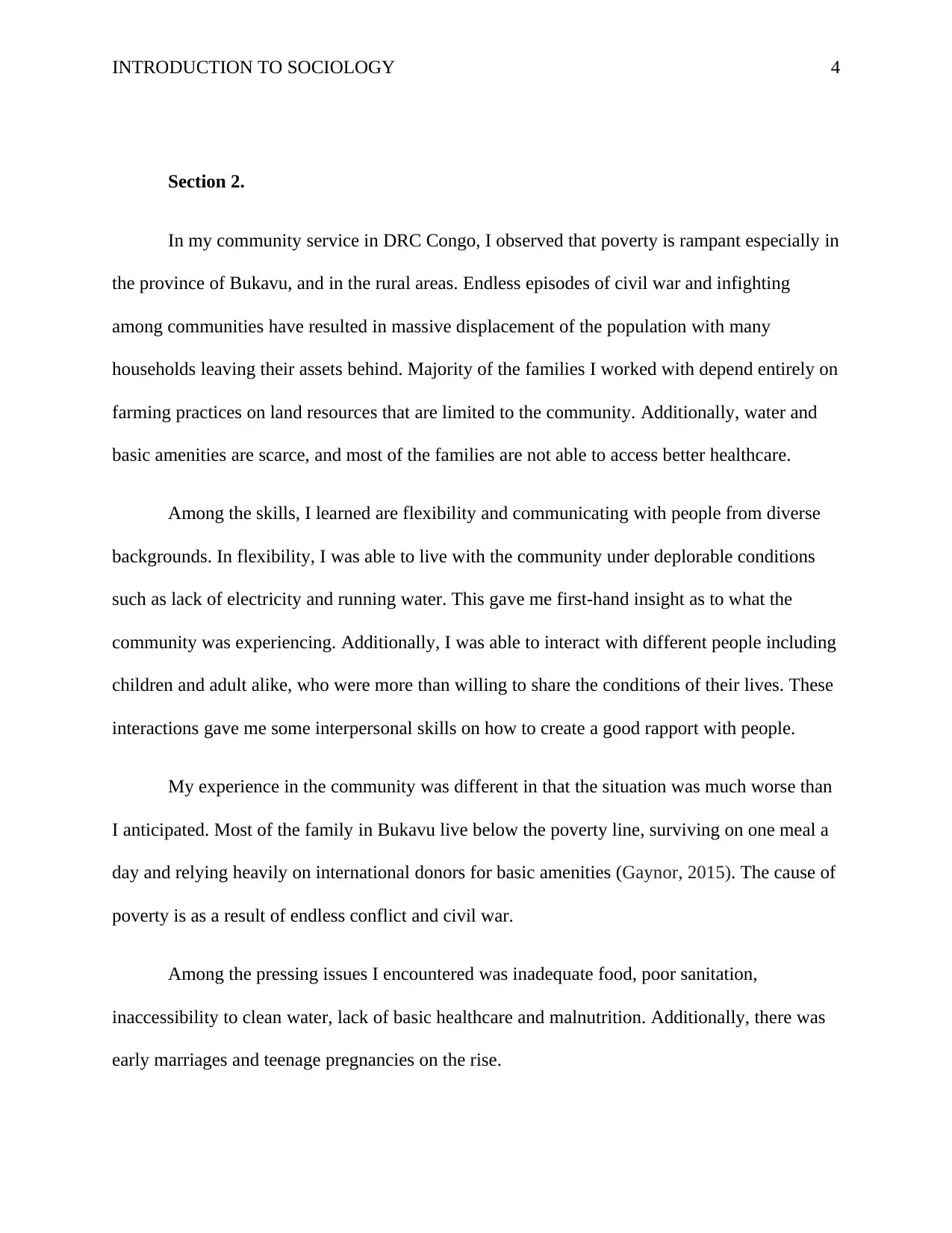
INTRODUCTION TO SOCIOLOGY 4
Section 2.
In my community service in DRC Congo, I observed that poverty is rampant especially in
the province of Bukavu, and in the rural areas. Endless episodes of civil war and infighting
among communities have resulted in massive displacement of the population with many
households leaving their assets behind. Majority of the families I worked with depend entirely on
farming practices on land resources that are limited to the community. Additionally, water and
basic amenities are scarce, and most of the families are not able to access better healthcare.
Among the skills, I learned are flexibility and communicating with people from diverse
backgrounds. In flexibility, I was able to live with the community under deplorable conditions
such as lack of electricity and running water. This gave me first-hand insight as to what the
community was experiencing. Additionally, I was able to interact with different people including
children and adult alike, who were more than willing to share the conditions of their lives. These
interactions gave me some interpersonal skills on how to create a good rapport with people.
My experience in the community was different in that the situation was much worse than
I anticipated. Most of the family in Bukavu live below the poverty line, surviving on one meal a
day and relying heavily on international donors for basic amenities (Gaynor, 2015). The cause of
poverty is as a result of endless conflict and civil war.
Among the pressing issues I encountered was inadequate food, poor sanitation,
inaccessibility to clean water, lack of basic healthcare and malnutrition. Additionally, there was
early marriages and teenage pregnancies on the rise.
Section 2.
In my community service in DRC Congo, I observed that poverty is rampant especially in
the province of Bukavu, and in the rural areas. Endless episodes of civil war and infighting
among communities have resulted in massive displacement of the population with many
households leaving their assets behind. Majority of the families I worked with depend entirely on
farming practices on land resources that are limited to the community. Additionally, water and
basic amenities are scarce, and most of the families are not able to access better healthcare.
Among the skills, I learned are flexibility and communicating with people from diverse
backgrounds. In flexibility, I was able to live with the community under deplorable conditions
such as lack of electricity and running water. This gave me first-hand insight as to what the
community was experiencing. Additionally, I was able to interact with different people including
children and adult alike, who were more than willing to share the conditions of their lives. These
interactions gave me some interpersonal skills on how to create a good rapport with people.
My experience in the community was different in that the situation was much worse than
I anticipated. Most of the family in Bukavu live below the poverty line, surviving on one meal a
day and relying heavily on international donors for basic amenities (Gaynor, 2015). The cause of
poverty is as a result of endless conflict and civil war.
Among the pressing issues I encountered was inadequate food, poor sanitation,
inaccessibility to clean water, lack of basic healthcare and malnutrition. Additionally, there was
early marriages and teenage pregnancies on the rise.
Paraphrase This Document
Need a fresh take? Get an instant paraphrase of this document with our AI Paraphraser
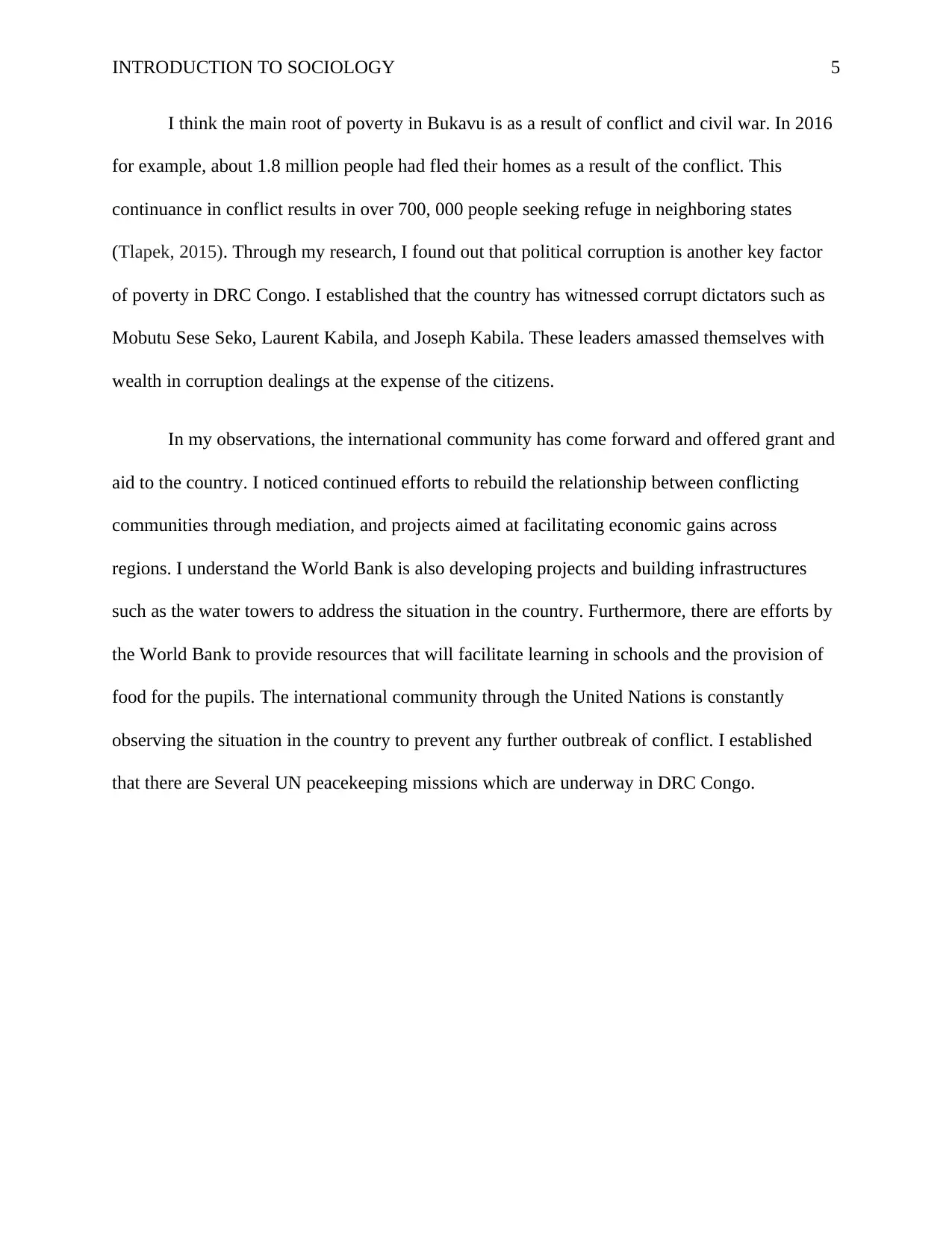
INTRODUCTION TO SOCIOLOGY 5
I think the main root of poverty in Bukavu is as a result of conflict and civil war. In 2016
for example, about 1.8 million people had fled their homes as a result of the conflict. This
continuance in conflict results in over 700, 000 people seeking refuge in neighboring states
(Tlapek, 2015). Through my research, I found out that political corruption is another key factor
of poverty in DRC Congo. I established that the country has witnessed corrupt dictators such as
Mobutu Sese Seko, Laurent Kabila, and Joseph Kabila. These leaders amassed themselves with
wealth in corruption dealings at the expense of the citizens.
In my observations, the international community has come forward and offered grant and
aid to the country. I noticed continued efforts to rebuild the relationship between conflicting
communities through mediation, and projects aimed at facilitating economic gains across
regions. I understand the World Bank is also developing projects and building infrastructures
such as the water towers to address the situation in the country. Furthermore, there are efforts by
the World Bank to provide resources that will facilitate learning in schools and the provision of
food for the pupils. The international community through the United Nations is constantly
observing the situation in the country to prevent any further outbreak of conflict. I established
that there are Several UN peacekeeping missions which are underway in DRC Congo.
I think the main root of poverty in Bukavu is as a result of conflict and civil war. In 2016
for example, about 1.8 million people had fled their homes as a result of the conflict. This
continuance in conflict results in over 700, 000 people seeking refuge in neighboring states
(Tlapek, 2015). Through my research, I found out that political corruption is another key factor
of poverty in DRC Congo. I established that the country has witnessed corrupt dictators such as
Mobutu Sese Seko, Laurent Kabila, and Joseph Kabila. These leaders amassed themselves with
wealth in corruption dealings at the expense of the citizens.
In my observations, the international community has come forward and offered grant and
aid to the country. I noticed continued efforts to rebuild the relationship between conflicting
communities through mediation, and projects aimed at facilitating economic gains across
regions. I understand the World Bank is also developing projects and building infrastructures
such as the water towers to address the situation in the country. Furthermore, there are efforts by
the World Bank to provide resources that will facilitate learning in schools and the provision of
food for the pupils. The international community through the United Nations is constantly
observing the situation in the country to prevent any further outbreak of conflict. I established
that there are Several UN peacekeeping missions which are underway in DRC Congo.
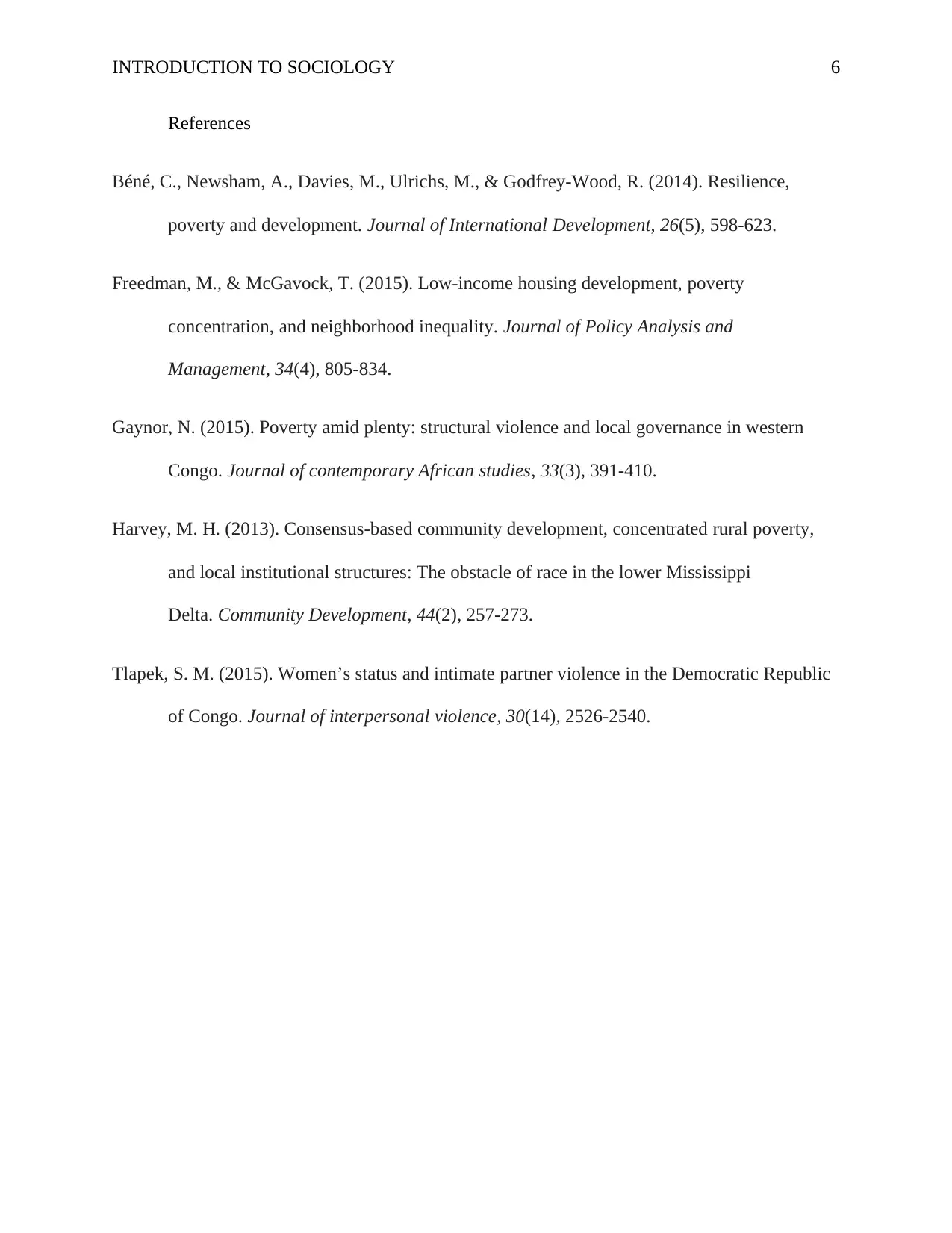
INTRODUCTION TO SOCIOLOGY 6
References
Béné, C., Newsham, A., Davies, M., Ulrichs, M., & Godfrey‐Wood, R. (2014). Resilience,
poverty and development. Journal of International Development, 26(5), 598-623.
Freedman, M., & McGavock, T. (2015). Low‐income housing development, poverty
concentration, and neighborhood inequality. Journal of Policy Analysis and
Management, 34(4), 805-834.
Gaynor, N. (2015). Poverty amid plenty: structural violence and local governance in western
Congo. Journal of contemporary African studies, 33(3), 391-410.
Harvey, M. H. (2013). Consensus-based community development, concentrated rural poverty,
and local institutional structures: The obstacle of race in the lower Mississippi
Delta. Community Development, 44(2), 257-273.
Tlapek, S. M. (2015). Women’s status and intimate partner violence in the Democratic Republic
of Congo. Journal of interpersonal violence, 30(14), 2526-2540.
References
Béné, C., Newsham, A., Davies, M., Ulrichs, M., & Godfrey‐Wood, R. (2014). Resilience,
poverty and development. Journal of International Development, 26(5), 598-623.
Freedman, M., & McGavock, T. (2015). Low‐income housing development, poverty
concentration, and neighborhood inequality. Journal of Policy Analysis and
Management, 34(4), 805-834.
Gaynor, N. (2015). Poverty amid plenty: structural violence and local governance in western
Congo. Journal of contemporary African studies, 33(3), 391-410.
Harvey, M. H. (2013). Consensus-based community development, concentrated rural poverty,
and local institutional structures: The obstacle of race in the lower Mississippi
Delta. Community Development, 44(2), 257-273.
Tlapek, S. M. (2015). Women’s status and intimate partner violence in the Democratic Republic
of Congo. Journal of interpersonal violence, 30(14), 2526-2540.
⊘ This is a preview!⊘
Do you want full access?
Subscribe today to unlock all pages.

Trusted by 1+ million students worldwide
1 out of 6
Related Documents
Your All-in-One AI-Powered Toolkit for Academic Success.
+13062052269
info@desklib.com
Available 24*7 on WhatsApp / Email
![[object Object]](/_next/static/media/star-bottom.7253800d.svg)
Unlock your academic potential
Copyright © 2020–2026 A2Z Services. All Rights Reserved. Developed and managed by ZUCOL.




